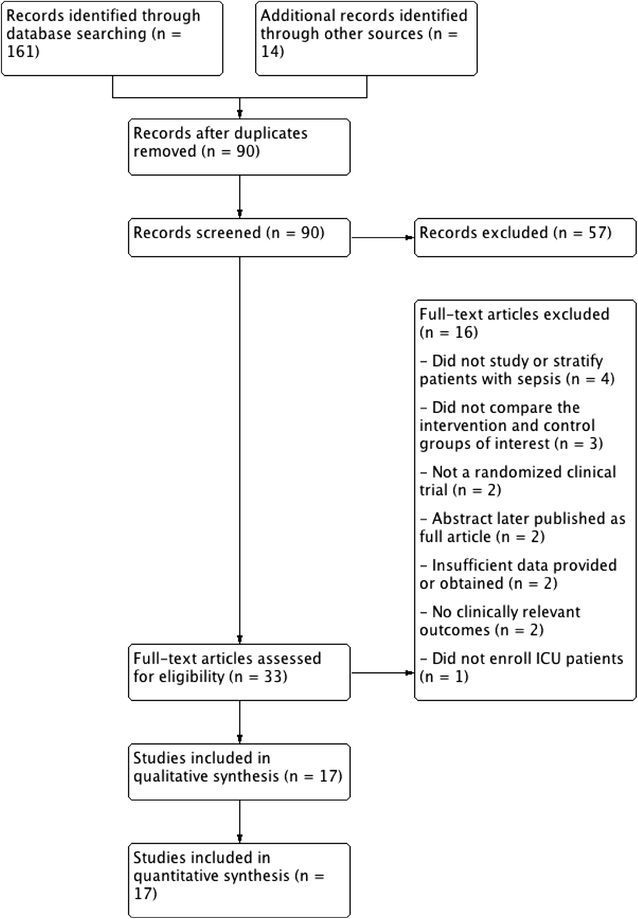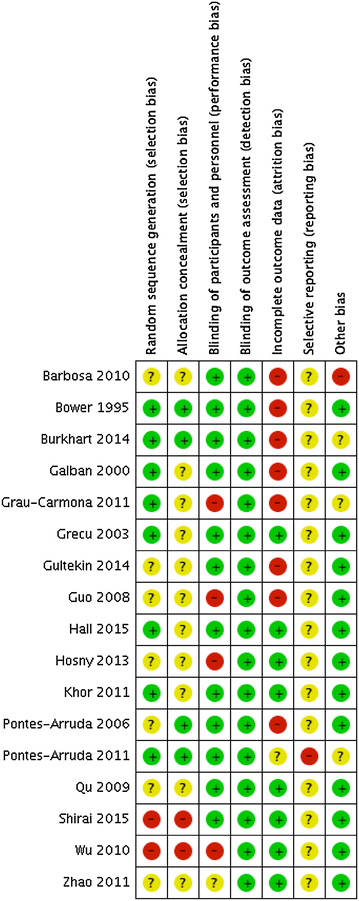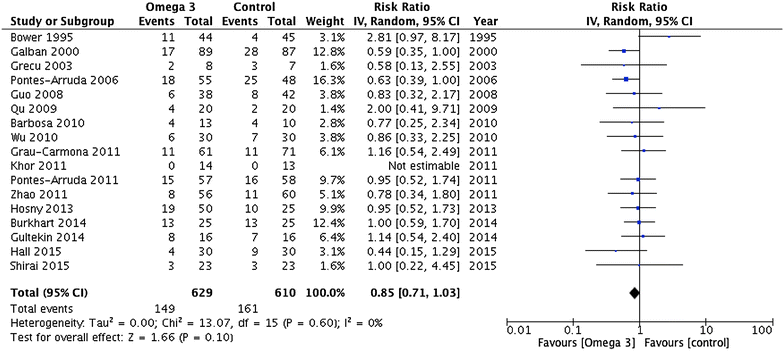Omega-3 supplementation in patients with sepsis: a systematic review and meta-analysis of randomized trials
- PMID: 28585162
- PMCID: PMC5459780
- DOI: 10.1186/s13613-017-0282-5
Omega-3 supplementation in patients with sepsis: a systematic review and meta-analysis of randomized trials
Abstract
Background: Nutritional supplementation of omega-3 fatty acids has been proposed to modulate the balance of pro- and anti-inflammatory mediators in sepsis. If proved to improve clinical outcomes in critically ill patients with sepsis, this intervention would be easy to implement. However, the cumulative evidence from several randomized clinical trials (RCTs) remains unclear.
Methods: We searched the Cochrane Library, MEDLINE, and EMBASE through December 2016 for RCTs on parenteral or enteral omega-3 supplementation in adult critically ill patients diagnosed with sepsis or septic shock. We analysed the included studies for mortality, intensive care unit (ICU) length of stay, and duration of mechanical ventilation, and used the Grading of Recommendations Assessment, Development and Evaluation approach to assess the quality of the evidence for each outcome.
Results: A total of 17 RCTs enrolling 1239 patients met our inclusion criteria. Omega-3 supplementation compared to no supplementation or placebo had no significant effect on mortality [relative risk (RR) 0.85; 95% confidence interval (CI) 0.71, 1.03; P = 0.10; I 2 = 0%; moderate quality], but significantly reduced ICU length of stay [mean difference (MD) -3.79 days; 95% CI -5.49, -2.09; P < 0.0001, I 2 = 82%; very low quality] and duration of mechanical ventilation (MD -2.27 days; 95% CI -4.27, -0.27; P = 0.03, I 2 = 60%; very low quality). However, sensitivity analyses challenged the robustness of these results.
Conclusion: Omega-3 nutritional supplementation may reduce ICU length of stay and duration of mechanical ventilation without significantly affecting mortality, but the very low quality of overall evidence is insufficient to justify the routine use of omega-3 fatty acids in the management of sepsis.
Keywords: Critical illness; DHA; EPA; Fish oil; ICU; Nutrition; Omega-3; PUFA; Sepsis.
Figures





Similar articles
-
Current evidence on ω-3 fatty acids in enteral nutrition in the critically ill: A systematic review and meta-analysis.Nutrition. 2019 Mar;59:56-68. doi: 10.1016/j.nut.2018.07.013. Epub 2018 Jul 31. Nutrition. 2019. PMID: 30419501
-
Omega-3 fatty acid supplementation is associated with favorable outcomes in patients with sepsis: an updated meta-analysis.J Int Med Res. 2020 Dec;48(12):300060520953684. doi: 10.1177/0300060520953684. J Int Med Res. 2020. PMID: 33373266 Free PMC article.
-
Glutamine dipeptide-supplemented parenteral nutrition improves the clinical outcomes of critically ill patients: A systematic evaluation of randomised controlled trials.Clin Nutr ESPEN. 2017 Feb;17:75-85. doi: 10.1016/j.clnesp.2016.09.007. Epub 2016 Oct 27. Clin Nutr ESPEN. 2017. PMID: 28361751 Review.
-
Cost analysis of Omega-3 supplementation in critically ill patients with sepsis.Clin Nutr ESPEN. 2018 Jun;25:63-67. doi: 10.1016/j.clnesp.2018.04.003. Epub 2018 Apr 19. Clin Nutr ESPEN. 2018. PMID: 29779820
-
Effects of fish oil-containing nutrition supplementation in adult sepsis patients: a systematic review and meta-analysis.Burns Trauma. 2022 Jun 10;10:tkac012. doi: 10.1093/burnst/tkac012. eCollection 2022. Burns Trauma. 2022. PMID: 35702267 Free PMC article.
Cited by
-
Mendelian Randomization Analysis Reveals Causal Associations of Polyunsaturated Fatty Acids with Sepsis and Mortality Risk.Infect Dis Ther. 2023 Jul;12(7):1797-1808. doi: 10.1007/s40121-023-00831-z. Epub 2023 Jun 14. Infect Dis Ther. 2023. PMID: 37316614 Free PMC article.
-
Omega-3 fatty acid-containing parenteral nutrition in ICU patients: systematic review with meta-analysis and cost-effectiveness analysis.Crit Care. 2020 Nov 3;24(1):634. doi: 10.1186/s13054-020-03356-w. Crit Care. 2020. PMID: 33143750 Free PMC article.
-
HDL and persistent inflammation immunosuppression and catabolism syndrome.Curr Opin Lipidol. 2021 Oct 1;32(5):315-322. doi: 10.1097/MOL.0000000000000782. Curr Opin Lipidol. 2021. PMID: 34374677 Free PMC article. Review.
-
Heart Rate Variability: A Potential Tool for Monitoring Immunomodulatory Effects of Parenteral Fish Oil Feeding in Patients With Sepsis.Nutr Metab Insights. 2019 May 7;12:1178638819847486. doi: 10.1177/1178638819847486. eCollection 2019. Nutr Metab Insights. 2019. PMID: 31105430 Free PMC article.
-
Nutritional Support with Omega-3 Fatty Acids in Burn Patients: A Systematic Review with Meta-Analysis of Randomized Controlled Trials.Nutrients. 2022 Jul 13;14(14):2874. doi: 10.3390/nu14142874. Nutrients. 2022. PMID: 35889830 Free PMC article.
References
LinkOut - more resources
Full Text Sources
Other Literature Sources
Research Materials
Miscellaneous

